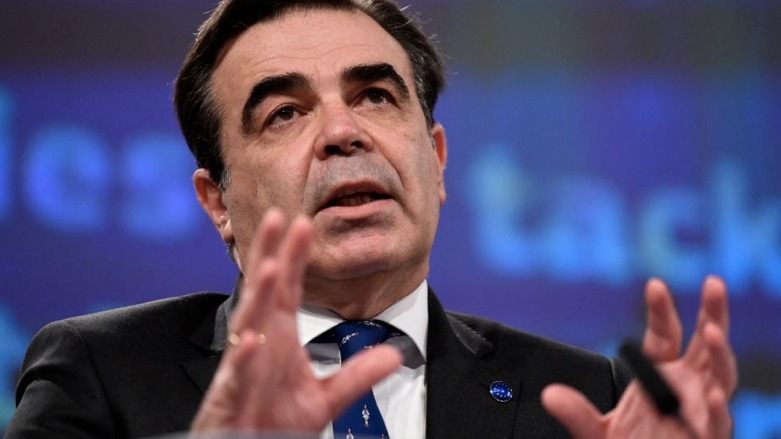EU Vice President to visit Kurdistan to discuss Belarus migrant crisis
"Iraqi people – mainly coming from Kurdistan – were told that the doors of Europe were open on the Belarusian border and were transported from Baghdad to Minsk and from Minsk to the border of Poland and Lithuania."

ERBIL (Kurdistan 24) – The European Commission Vice President Margaritis Schinas will soon visit the Kurdistan Region capital Erbil and other capitals in the region to discuss the migrant issue on the Belarus-Polish border, a senior EU official told the EU parliament on Wednesday.
Josep Borrell, the European Union's High Representative for Foreign Affairs and Security Policy, who visited the Kurdistan Region in early September, told the EU parliament on Wednesday that the President of the EU Commission Ursula von der Leyen instructed Commissioner Schinas to go to Abu Dhabi, Beirut, Baghdad and Erbil in the coming days.
Read More: Josep Borrell from Erbil: Europe is committed to 'solidarity and support' for Kurdistan Region
"There are many other places. And later, also to Ankara, to specifically discuss this crisis, which is putting European Union borders under pressure at the cost of human suffering and human lives," he said. "It is clear that the Belarusian authorities are using human beings as a tool for political purposes. This summer, it started from Iraq."
"Iraqi people – mainly coming from Kurdistan – were told that the doors of Europe were open on the Belarusian border and were transported from Baghdad to Minsk and from Minsk to the border of Poland and Lithuania," he added.
Borrell said he personally intervened with Iraq's foreign ministry and praised Baghdad for taking concrete measures, such as suspending direct flights and closing two honorary Belarusian consulates in the country.
However, he said the number of migrants traveling to Belarus vastly increased in October.
"But now our outreach has to be much more extended because it is not a point-to-point travel with a single or a couple of actors; it is a full network of destinations with transit countries, involving a lot of airlines and a lot of people."
He said many other airports in the Middle East have been used as a hub to send people from Syria, Iraq, and Afghanistan to Belarus and, from there, to the borders with other European countries.
"Istanbul remains one of the main transit hubs for the migrants. From Dubai, from Yerevan, from Damascus, from Jordan, from Lebanon, big planes that at the beginning were small charters, after, there were big planes with 400 people on board," he said.
"We have been engaging in diplomatic outreach alerting the countries of origin and transit about this situation and asking them for cooperation to stop this flow."
The EU official said that people are being cheated by travel agencies with promises of free entry to Europe. "They are being asked to pay $6,000 or $7,000 for a travel that goes nowhere."
"Our Delegations will do whatever they can in order to spread this information. But the desperation of so many people is so big that maybe they do not care and they are ready to take the risk."
During a press conference on Wednesday in Erbil, Safeen Dizayee, head of the KRG Department of Foreign Relations (DFR), said that the Kurdistan Region is ready to facilitate the return of those who voluntarily want to return to the region.
Read More: 'KRG is ready to facilitate the voluntary return of migrants to the region': official
"As you know today, there are political problems between Belarus and the EU and those people on the border are the victims of these political problems," he added.
"We call on our people not to put their destiny in the hands of human traffickers. As we see in the photos, the families are facing an unknown destiny in the cold weather, and there have even been two Kurdish deaths so far."
He re-emphasized that the Kurdish government doesn't want Kurdish migrants to be pressured to come back against their will. "We call on the EU to provide humanitarian support to the migrants temporarily until the problem is solved."
Editing by Paul Iddon.